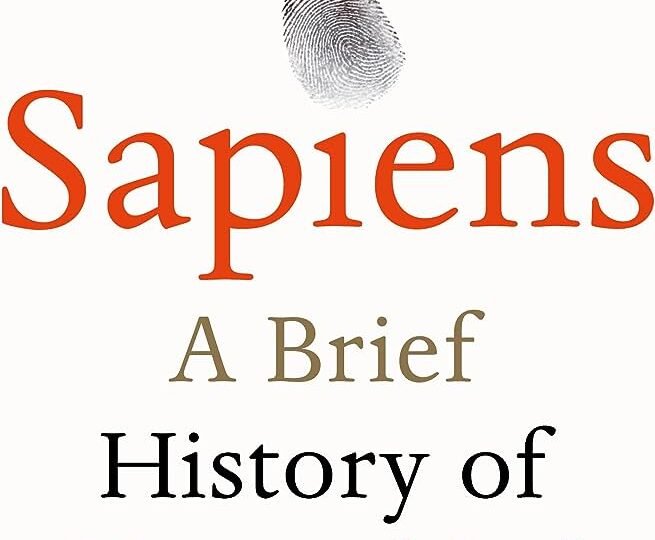Sapiens A Brief History of Humankind: What’s this book about? | Before You Buy | Synopsis | Summary
December 8, 2023 | by whatsthisbookabout.com

Sapiens A Brief History of Humankind: What’s this book about? | Before You Buy
Synopsis | Summary
Sapiens: A Brief History of Humankind by Yuval Noah Harari is a groundbreaking exploration of the human species’ evolution, development, and influence on the world. Harari’s ambitious and thought-provoking narrative spans 2.5 million years of human history, from the emergence of Homo sapiens in the Stone Age to the modern age of technology and genetic engineering. With his multidisciplinary approach, Harari delves into anthropology, history, economics, and philosophy, offering fresh perspectives on the key milestones that have shaped humanity.
A Journey Through Human History: From the Cognitive Revolution to Today
At its core, Sapiens tells the story of how a relatively insignificant species evolved into the dominant force on Earth. Harari begins by examining the Cognitive Revolution—the moment Homo sapiens gained the capacity for abstract thought and complex language, allowing us to collaborate in large groups. According to Harari, this ability to believe in shared myths—such as gods, nations, and money—is what set humans apart and enabled us to conquer the world.
One of the book’s most surprising arguments is that the Agricultural Revolution—often seen as a leap forward in human progress—was actually a “trap.” Harari contends that while it allowed humans to produce more food and build civilizations, it also led to harsher living conditions for individuals, as they were tied to labor-intensive farming and rigid social hierarchies. In this view, wheat did not just domesticate us; it shaped the very fabric of human society.
As Harari charts the course of history, he explains how the invention of writing, money, and empire allowed societies to scale and solidify their power. His analysis of capitalism is particularly intriguing, as he portrays it not merely as an economic system but as a “religion” that thrives on growth, trust, and the collective belief in credit. Harari points out that capitalism’s success is largely due to its ability to unite people through a shared trust in currency, making it one of the most pervasive ideologies in history.
Challenging Assumptions: Humanity’s Impact on the World
Harari doesn’t shy away from critiquing humanity’s ecological footprint. He discusses the devastating impact Homo sapiens had on the environment and other species, suggesting that early humans were responsible for the extinction of many large animals long before the Industrial Revolution. He also examines the darker side of modern agriculture, arguing that the treatment of animals in industrial farming may go down as one of history’s gravest atrocities.
Sapiens is not just a recounting of what happened; it’s a reflection on why things turned out the way they did and what it means for us today. Harari challenges readers to think critically about the myths and structures that govern modern life—whether that’s nationalism, religion, or the concept of individualism. He prompts us to consider whether these systems truly serve our well-being, or if we’re trapped by ideas we’ve invented ourselves.
A Glimpse Into the Future: What’s Next for Humanity?
Toward the end of the book, Harari raises a thought-provoking question: What does the future hold for Homo sapiens? With advancements in technology, artificial intelligence, and genetic engineering, Harari predicts that humanity could soon upgrade itself into a new species altogether. He suggests that we may one day acquire “god-like” abilities, fundamentally altering the course of history and perhaps even ending it in its traditional form. For Harari, this isn’t just speculation—it’s a pressing issue that will shape the future of life on Earth.
Why Sapiens Stands Out
What makes Sapiens such a compelling read is Harari’s ability to weave together complex ideas and present them in an accessible and engaging way. His writing is clear, vivid, and often humorous, drawing readers into deep philosophical and historical questions without overwhelming them. Harari’s willingness to challenge conventional wisdom—whether about the role of empires, the nature of happiness, or the ethical implications of modern farming—makes this book not just informative, but transformative.
Key Themes in Sapiens
- Humanity’s Cognitive Edge
Harari’s thesis revolves around the idea that humans dominate the world because of our ability to cooperate on a large scale through shared beliefs in things that don’t physically exist—such as gods, corporations, and nations. This cognitive revolution enabled Homo sapiens to unite in ways no other species could. - The Cost of Progress
From the Agricultural Revolution to modern capitalism, Harari highlights the unintended consequences of so-called “progress.” While these developments enabled societies to flourish, they also came at a cost—whether in terms of human suffering, environmental destruction, or social inequality. - The Role of Myth in Society
Harari provocatively argues that much of what we take for granted as reality—money, corporations, human rights—are fictional constructs. These shared myths allow large groups of humans to cooperate, but they also confine us to systems that can perpetuate inequality and injustice. - The Future of Homo Sapiens
The final chapters focus on the future, as Harari speculates on how technology could reshape humanity. With advances in biotechnology and artificial intelligence, he suggests that we may soon face the end of Homo sapiens as we know it.
Should You Read Sapiens?
If you’re someone who enjoys thought-provoking books that challenge your worldview, Sapiens is a must-read. It’s more than just a history book—it’s an intellectual journey that will leave you questioning humanity’s past, present, and future. Harari’s ability to link seemingly unrelated topics like biology, economics, and philosophy into one cohesive narrative makes this book both enlightening and entertaining. Whether you’re a history buff, a lover of anthropology, or simply curious about how we got here, Sapiens will offer fresh insights into the story of humanity.
Final Thoughts: A Masterpiece of Big Ideas
Sapiens: A Brief History of Humankind is a landmark book that stands out for its ambitious scope, bold arguments, and insightful analysis of what it means to be human. Harari has crafted a narrative that is as compelling as it is enlightening, offering readers a unique lens through which to view their place in the world. This is not just a book about history—it’s a book about our future, and the choices we face as we continue to shape the world around us.
If you’re ready for a mind-expanding read that tackles the biggest questions of human history and society, then Sapiens is the book for you. Don’t miss the opportunity to explore this fascinating and transformative journey through the ages.
Buy this book on Amazon – https://amzn.to/3XJzbVt
Looks like you are an Intellectual. If you are wondering what kind of other books you might like, have a look at this post about 5 Readers and their book preferences.
RELATED POSTS
View all



